- Home
- Joe McKinney
Plague of the Undead
Plague of the Undead Read online
Raves for Joe McKinney
“A rising star on the horror scene!”
—FearNet.com
“Joe McKinney’s first zombie novel, Dead City, is one of
my all-time favorites of the genre. It hits the ground
running and never lets up. Apocalypse of the Dead proves
that Joe is far from being a one-hit wonder. This book is
meatier, juicier, bloodier, and even more compelling . . .
and it also NEVER LETS UP. From page one to the
stunning climax this book is a rollercoaster ride of action,
violence, and zombie horror. McKinney understands the
genre and relies on its strongest conventions while at the
same time adding new twists that make this book a
thoroughly enjoyable read. That’s a defining characteristic
of Joe’s work: the pace is so relentless that you feel like
it’s you, and not the character, who is running for his life
from a horde of flesh-hungry monsters.
“And, even with that lightning-fast pace, McKinney
manages to flesh the characters out so that they’re real,
and infuse the book with compassion and heartbreak
over this vast, shared catastrophe.
“This book earns its place in any serious library of
living-dead fiction.”
—Jonathan Maberry, New York Times best-selling author of
The Wolfman
“Dead City is much more than just another zombie novel.
It’s got heart and humanity—a merciless, fast-paced, and
genuinely scary read that will leave you absolutely breathless.
Highly recommended!”
—Brian Keene
“The pace never lets up as McKinney takes us through
the zombie apocalypse in real time—every second of
terror is explored in depth as the world goes to hell.”
—David Wellington, author of Monster Island
“Dead City is an absolute must-read for zombie lovers,
but McKinney’s excellent storytelling makes it a great
read for anyone who loves the thrill of a gruesomely
delicious page-turner.”
—Fran Friel, Bram Stoker Award–nominated author of
Mama’s Boy and Other Dark Tales
“Dead City is a zombie tour de force—the story
moves along at breakneck speed and never lets up. Joe
McKinney knows how to toy with readers’ emotions,
masterfully capturing the essence of humanity in the
face of unspeakable horror.”
—Amy Grech, author of Apple of My Eye and
Blanket of White
“Joe McKinney’s Dead City is a tense, thrill-a-page
nightmare, written with great passion and authority. Surely
one of the best zombie novels ever set down in blood.”
—Lisa Morton, two-time Bram Stoker Award–winner
“Dead City wastes no time jumping straight into mile-
a-minute thrills and gruesome action. This seminal
zombie novel culminates in a heart-wrenching finale,
and I found that as the undead hordes multiplied, so too
did my respect and admiration for author Joe McKinney.
If you like your thrillers served with an extra helping
of intensity, you’re going to love Dead City!”
—Joel A. Sutherland, Bram Stoker Award–nominated
author of Frozen Blood
“Dead City is an action packed, pedal-to-the-metal zombie
novel that never loses sight of its humanity. McKinney uses
his background as a homicide detective to bring a level of
realism to his vision of the apocalypse that is both urgent
and frightening. A timely nightmare that you will not put
down. I can’t wait to see where this series leads.”
—Gregory Lamberson, author of Personal Demons and
Johnny Gruesome
“McKinney writes zombies like he’s been gunning
them down all of his life.”
—Weston Ochse, Author of Empire of Salt
“Dead City is a full-throttle page burner that torques up
the terror and does not let up. You’ll want the shotgun
seat for this wild ride. Bring a crash helmet.”
—J. L. Comeau, Countgore.com
“Welcome to Joe McKinney’s Dead City universe, a
relentless thrill ride where real characters do bloody
things on nightmare streets. Break out the popcorn,
you’re in for a real treat.”
—Harry Shannon, author of Dead and Gone
“Dead City is a well-written and compelling first novel.
A scary, fast-paced ride, full of hair-raising twists and
turns that keep the reader spellbound. Do yourself
a favor and snag a copy . . . thank me later.”
—Gene O’Neill, author of Taste of Tenderloin
and Deathflash
“Fast-paced, entertaining . . . five headshots out of five.”
—D. L. Snell, coauthor of Demon Days
“A fantastic tale of survival horror that starts with
a bang and never lets up.”
—Zombiehub.com
“McKinney continues to lead the genre of zombie fiction.”
—Craig DiLouie, author of The Infection
“Mutated delivers pulse-pounding action with precision,
intelligence, and most importantly, heart. McKinney proves
once again that he understands the power of the zombie
subgenre better than any other writer.”
—Peter Giglio, author of Anon and co-author
of The Dark
PLAGUE of the UNDEAD
JOE MCKINNEY
PINNACLE BOOKS
Kensington Publishing Corp.
www.kensingtonbooks.com
All copyrighted material within is Attributor Protected.
Table of Contents
Raves for Joe McKinney
Title Page
PUBLISHER’S NOTE
ACKNOWLEDGMENTS
Epigraph
part one - KILLING JERRY
1
2
3
4
5
part two - OUTWARD BOUND
6
7
8
9
10
11
12
13
14
15
16
part three - TRACTS AND BRIDEMEAT
17
18
19
20
21
22
23
24
25
26
27
28
29
30
31
part four - THE WRECK
32
33
34
35
36
37
38
39
40
41
42
43
part five - THE EMPTY TOWNS
44
45
46
Four Tales from the First Days of the Living Dead
State of the Union
Jimmy Finder and the Rise of the Templenauts
Resurrecting Mindy
Bury My Heart at Marvin Gardens
Copyright Page
PUBLISHER’S NOTE
In the pages th
at follow you’ll find descriptions of how to modify several readily available weapons, such as the Ruger 10/22. All of the methods discussed herein have been field-tested and actually work as described. However, do not try to duplicate them yourself. Modifying a firearm is something best left to trained and licensed gunsmiths. Doing it yourself could lead to serious injury or death. Also, some of the modifications described in this book constitute a violation of federal and state law, and could get you into some serious hot water with the ATF. Not a good thing, believe me.
ACKNOWLEDGMENTS
A lot goes into taking a book from a nascent idea to a finished product in the reader’s hands. The famous writer’s adage of put butt in chair is certainly a major part of that process, if not the most important part. Along the way, though, there are countless encounters, countless accidental readings, conversations, observations, whatever, that eventually shape the final form of a book. The volume you hold in your hand is no different. It is the result of many hours of butt in chair, but also many more accidental moments of inspiration than I can possibly remember or acknowledge here.
But I’ll try.
These are just a few of the people who helped me put this book in your hand. Ethan Humble, Steven Grover, Anastacio Hernandez, Steve Almanza, and Genaro Villarreal for minding the store at West Patrol so I could take the time off to write this book. And a special second thank-you to Ethan Humble and Steve Almanza, for sharing their gun expertise. What I got right here I owe to them. What I messed up, well, that’s on me. I owe a huge debt of gratitude to the members of Candlelight—David Liss, Robert Jackson Bennett, Hank Schwaeble, and Rhodi Hawk—for their wisdom as story doctors and for the hours of great conversation. I’m also fortunate enough to be a member of Drafthouse, along with my very good friends Sanford Allen, Beckie Ugolini, Thomas McAuley, and Brian Allen, fantastic writers all who shared their time and storytelling skills again and again. I also want to thank my editor at Kensington, Gary Goldstein, for his sage counsel in my hour of need, and my agent, Jim Donovan, for going the extra mile on my behalf. And, most of all, thanks and gratitude and love go out to my wife, Kristina, and our two girls, Elena and Brenna, for putting up with the epic amount of crazy that went into writing this book.
While walking in the tall grass that has sprung up
around the city of Troy, Balso Snell came upon the
famous wooden horse of the Greeks. A poet, he
remembered Homer’s ancient song and decided to
find a way in.
—NATHANAEL WEST,
The Dream Life of Balso Snell
part one
KILLING JERRY
1
As Jacob Carlton crossed Main Plaza, his boots crunching on the frozen grass, he was thankful the woman had finally stopped screaming.
For the last two weeks, ever since her husband’s sentence was handed down, Amanda Grieder had been living in the street outside her husband’s cell, crying for someone to come to their senses and show a little mercy. It was February, and it was cold, and most mornings found her hair and clothes crusted with ice. She’d stopped eating, stopped taking care of herself. She couldn’t be consoled. Her friends tried to get her to go home, even tried to pick her up and carry her home at one point, but she would have none of it. After that, whenever they tried to touch her, she fought them, and then the screaming and wailing would start up again and it would carry through the whole town like a sickness, laying everybody low. There was talk that the law should make her leave, do something with her, for her own good, for everybody’s peace of mind, but so far Sheriff Taylor had held off doing that. Jacob didn’t understand the old man’s reticence, but he knew Sheriff Taylor had his reasons. He always did.
Jacob braced himself as he turned the corner onto Jackson Avenue, where Amanda had set up her temporary residence. He said a silent prayer that he wouldn’t have to deal with her again today. Every morning he had to pass the little makeshift shelter where she kept watch. He’d try to walk by unobserved, but then she’d see him, and no matter how cold or hungry she was, no matter how shredded her voice was from howling all the day before, she always seemed to have a little extra just for him. She’d get up from the sidewalk and rush at him, screaming that he’d made a mistake, that he was wrong about her husband. As sick as her accusations made him feel, he knew he wasn’t up for enduring that gauntlet today. Not today, not the day of the execution. He just didn’t have it in him.
But to his surprise—and this shamed him, for he was relieved—she wasn’t there. The blankets and baskets of food well-meaning folks had brought for her were still there, but she was gone.
He let out the breath he’d been holding and tried to collect himself, but his nerves were a jangled mess. His skin felt hot one moment, cold the next. His stomach was twisting into knots. He had the jitters, like he’d drunk too much coffee on an empty stomach. For two weeks he’d felt this way, and he suspected it was making him sick. Not only heartsick, but actually physically ill.
But sick as he was, he had to keep moving. If he stopped, he’d lose his nerve. Looking into himself, he knew that. The way things were piling up inside his head, all it would take would be to stop moving. If that happened, he’d likely as not turn tail, run home, and hide his head in the toilet as he vomited away his jitters. If, indeed, that was even possible. So he ducked his head against the cold February wind and shoved his hands into his pockets and slipped into the constabulary office like a villain.
It was early, and Steve Harrigan was the only one in the office. He was standing over by the filing cabinets, and when he heard the door and saw Jacob standing there he looked genuinely surprised. “Wasn’t expecting to see you this morning,” he said.
Jacob nodded. “Where’s the bike checkout log?”
Harrigan studied the younger man for a long moment. He closed a metal drawer and it shoved in place with a heavy clank. Harrigan gestured toward the back wall with his chin. “Should be over there on the shelf, behind Harris’s desk.”
Jacob crossed to the shelf the older deputy had indicated. The bike log was a red, hardbound memo book that was almost as old as Jacob was. There were entries going back as far as his school days, when he was taking his first lessons in the Code he now enforced. He turned to the back and quickly scribbled his name on the next open line.
“Gonna try to clear your head?” Harrigan said.
“I was thinking of going for a ride, yeah. I thought I’d go check on the new construction over on the east wall.”
“Still draining the wetlands, from what I hear.”
Jacob nodded. “Where’s Taylor? I noticed Amanda’s gone.”
“He’s with her in his office.”
“Oh, God, really?”
“Yeah. They’ve been in there for about an hour now. She finally stopped crying just a bit ago. Poor woman, she’s coming apart at the seams.”
“Is he gonna let her be in the Square today?”
“Can’t tell her no. It’s her right under the Code.”
Jacob could tell the older deputy was sizing him up. Harrigan was a real cop, trained in the old ways, from before the world fell apart. Not like Jacob, who had sort of stumbled into the role of chief deputy, a kid trying to figure it out as he went along.
Harrigan was an affable, lanky man with pale skin and thin gray hair and liver spots on his face, always quick with a smile. But of course that smile was gone now. He put the file he was holding on his desk, lit a candle, and shook the match out. “We’re almost out of these,” he said, and dropped it into an ashtray. “The ones they make over at the school don’t hardly ever work. We go through ’em so fast.”
“I’ll tell Frank Hartwell to get some more next time he’s outside the walls.”
Jacob put the ledger back on the shelf and turned to leave. He was almost to the door when Harrigan called after him. “Hey, Jacob, a moment.”
Jacob stopped in the doorway, looking back at him over his shoulder. “I’m not much in
the mood for a speech, Steve, if you don’t mind.”
“No, I bet not. But I know this is tearing you up inside. You wouldn’t be half the man I know you to be if it wasn’t.”
“I don’t feel like a good man right now, Steve. All I want to do is go stick my head in a hole and hide.”
“Same thing Arthur went through when he had to do it.”
“And how did Arthur handle it?”
“Spent the whole morning throwing up.”
Jacob nodded. “Sounds about right.”
“Nobody said it was easy.”
“Easy,” Jacob said, and laughed in disgust.
“This is the right thing to do, Jacob. I believe that. I believe in the Code. It’s us against the world. We have to trust each other. Any man who steals from his brother breaks that trust. And that man has to die.”
“That’s the same thing you told me when you were teaching my Code class back in school. You need to get a new line.”
“It’s not a line, Jacob. It’s what I believe in. It’s what everybody in this town believes in. The Code is hard sometimes, but it’s what keeps us alive. Think on that while you’re riding.”
The older deputy didn’t cow Jacob, not these days. In his youth, all the First Generation had seemed hard and determined, like iron, but he was thirty-five-years old, and he’d faced most of them in council meetings and in the living rooms of their homes when things went wrong. So Harrigan’s words didn’t rattle him. They only made him tired. He’d heard the same thing every day of his life since the time he was old enough to understand what was being said to him. And he’d always thought he believed it. But now that he was going to have to kill a man he’d known since they were kids, belief came a lot harder.

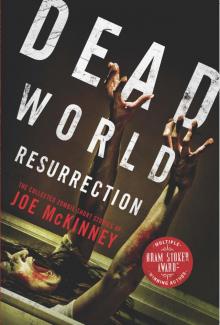 Dead World Resurrection
Dead World Resurrection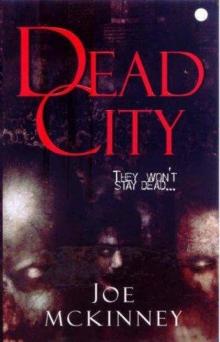 Dead City - 01
Dead City - 01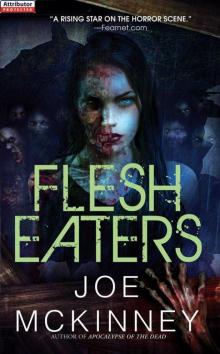 Flesh Eaters
Flesh Eaters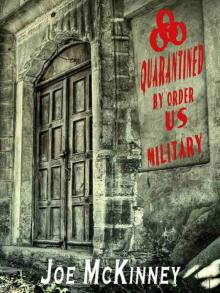 Quarantined
Quarantined Ultimate Undead Collection: The Zombie Apocalypse Best Sellers Boxed Set (10 Books)
Ultimate Undead Collection: The Zombie Apocalypse Best Sellers Boxed Set (10 Books)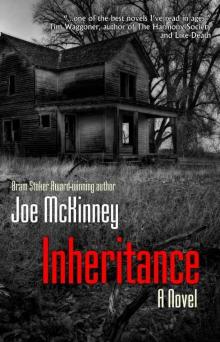 Inheritance
Inheritance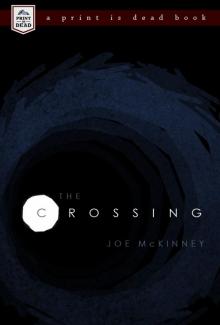 The Crossing: A Zombie Novella
The Crossing: A Zombie Novella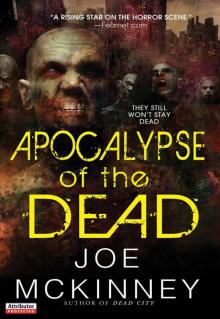 Apocalypse of the Dead
Apocalypse of the Dead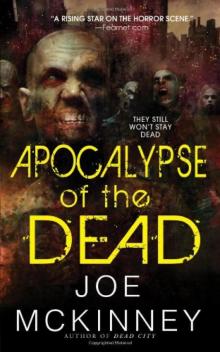 Apocalypse of the Dead - 02
Apocalypse of the Dead - 02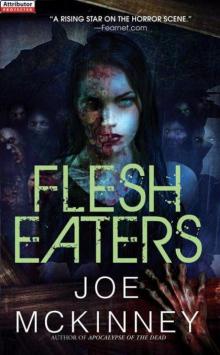 Flesh Eaters - 03
Flesh Eaters - 03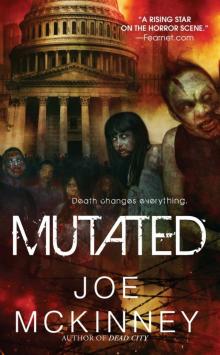 Mutated
Mutated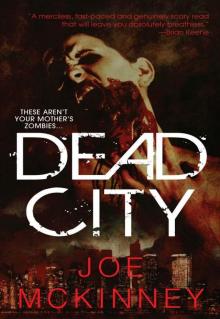 Dead City
Dead City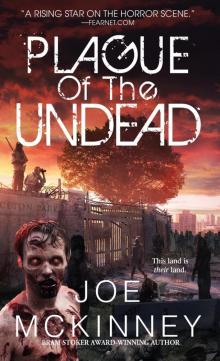 Plague of the Undead
Plague of the Undead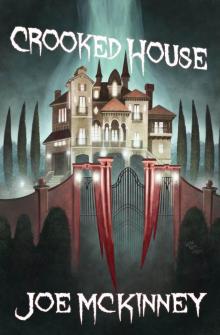 Crooked House
Crooked House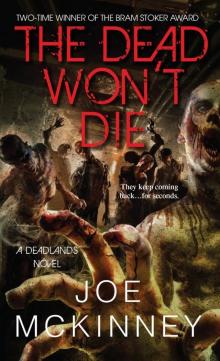 The Dead Won't Die
The Dead Won't Die